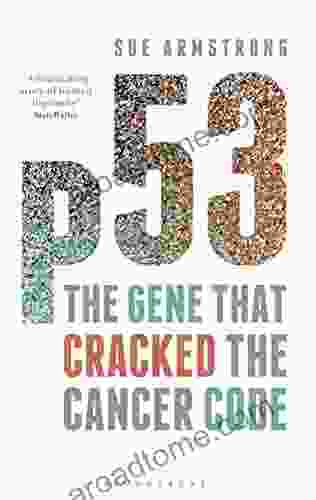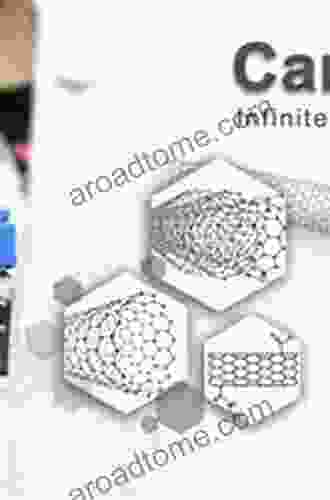P53: The Gene That Cracked the Cancer Code

In the realm of medical science, the discovery of the p53 gene marked a profound breakthrough in our understanding of cancer. This extraordinary gene, often hailed as the "guardian of the genome," plays a pivotal role in safeguarding the integrity of our genetic material and preventing the development of cancerous cells.
4.4 out of 5
| Language | : | English |
| File size | : | 2189 KB |
| Text-to-Speech | : | Enabled |
| Screen Reader | : | Supported |
| Enhanced typesetting | : | Enabled |
| Word Wise | : | Enabled |
| Print length | : | 306 pages |
Unveiling the Power of p53: A Guardian of Genetic Stability
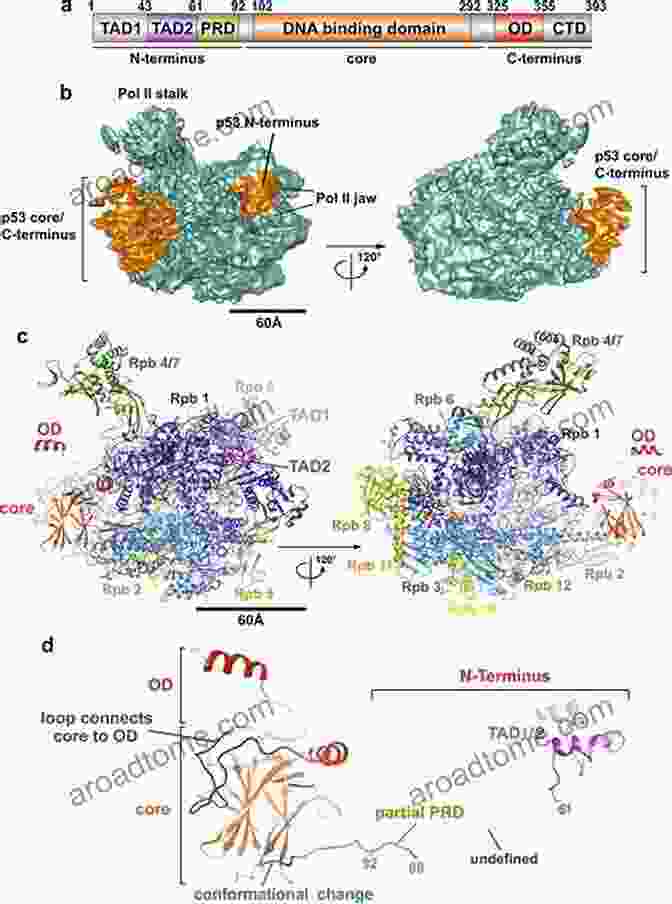
The p53 gene encodes a protein of the same name that serves as a crucial tumor suppressor. This protein acts as a vigilant sentinel, constantly monitoring the health of our cells and intervening when abnormalities arise. Its primary function is to detect DNA damage, which can occur due to various factors such as exposure to radiation, environmental toxins, and even errors during cell division.
When DNA damage is detected, p53 swings into action, activating a cascade of cellular responses aimed at preventing the propagation of damaged cells. These responses can include halting the cell cycle, initiating DNA repair mechanisms, and triggering apoptosis (programmed cell death) if the damage is too extensive.
P53 Mutations: A Disturbing Link to Cancer
Unfortunately, the p53 gene is not immune to mutations. These alterations can disrupt the normal functioning of the p53 protein, rendering it incapable of carrying out its critical tumor suppressor duties. Such mutations are alarmingly common in cancer, with studies indicating that they occur in over 50% of all human tumors.
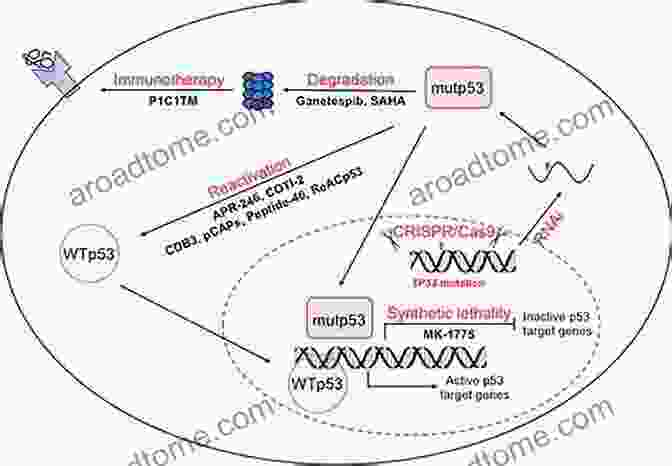
The consequences of p53 mutations are dire. When this guardian of the genome is compromised, cells lose their ability to control growth and division, leading to the uncontrolled proliferation characteristic of cancer. Additionally, p53 mutations can impair the immune system's ability to recognize and eliminate cancerous cells, further contributing to tumor progression.
Harnessing the Power of p53: Novel Cancer Therapies
The profound impact of p53 mutations on cancer development has fueled a surge in research efforts to exploit this gene's potential for therapeutic interventions. Scientists are exploring a wide range of strategies, including:
- Activating Mutant p53: Restoring the function of mutated p53 proteins is a promising approach. Researchers are developing small molecules that can bind to and reactivate mutant p53, essentially restoring its tumor suppressor capabilities.
- Inhibiting MDM2: MDM2 is a protein that normally regulates p53 activity. In certain cancers, MDM2 overexpression can suppress p53 function. Drugs that inhibit MDM2 can unleash p53's tumor suppressor potential.
- Gene Therapy: Introducing a functional p53 gene into cancer cells is another potential treatment strategy. This approach aims to replace mutated or deleted p53 genes and restore normal tumor suppressor function.
P53: A Transformative Discovery in Cancer Research
The discovery of the p53 gene has revolutionized our understanding of cancer. This "guardian of the genome" plays a pivotal role in maintaining genetic stability and preventing the development of cancerous cells. While mutations in p53 are common in cancer, they also present opportunities for novel therapeutic interventions.
Ongoing research on p53 holds immense promise for developing targeted therapies that can effectively combat cancer. By harnessing the power of this remarkable gene, we may one day crack the code to a future free from this devastating disease.
4.4 out of 5
| Language | : | English |
| File size | : | 2189 KB |
| Text-to-Speech | : | Enabled |
| Screen Reader | : | Supported |
| Enhanced typesetting | : | Enabled |
| Word Wise | : | Enabled |
| Print length | : | 306 pages |
Do you want to contribute by writing guest posts on this blog?
Please contact us and send us a resume of previous articles that you have written.
 Book
Book Novel
Novel Page
Page Chapter
Chapter Text
Text Story
Story Genre
Genre Reader
Reader Library
Library Paperback
Paperback E-book
E-book Magazine
Magazine Newspaper
Newspaper Paragraph
Paragraph Sentence
Sentence Bookmark
Bookmark Shelf
Shelf Glossary
Glossary Bibliography
Bibliography Foreword
Foreword Preface
Preface Synopsis
Synopsis Annotation
Annotation Footnote
Footnote Manuscript
Manuscript Scroll
Scroll Codex
Codex Tome
Tome Bestseller
Bestseller Classics
Classics Library card
Library card Narrative
Narrative Biography
Biography Autobiography
Autobiography Memoir
Memoir Reference
Reference Encyclopedia
Encyclopedia Rochelle Cheever
Rochelle Cheever Warawaran Roongruangsri
Warawaran Roongruangsri Zainurrahman
Zainurrahman Anni Rose
Anni Rose Laura Kemp
Laura Kemp Whoopi Goldberg
Whoopi Goldberg Thomas Schlesser
Thomas Schlesser Valerie Gross
Valerie Gross Shane Adams
Shane Adams Douglas Weiss
Douglas Weiss Soulperfect Books
Soulperfect Books Silvia Moon
Silvia Moon Sukhendu Mandal Phd
Sukhendu Mandal Phd Robb Pearlman
Robb Pearlman Stevie Cameron
Stevie Cameron Xiuyu Wang
Xiuyu Wang Yacoub Binguitcha Fare
Yacoub Binguitcha Fare Robert J Sternberg
Robert J Sternberg Madeline Crawford
Madeline Crawford Werner Gitt
Werner Gitt
Light bulbAdvertise smarter! Our strategic ad space ensures maximum exposure. Reserve your spot today!
 Ian MitchellFollow ·2.1k
Ian MitchellFollow ·2.1k Jonathan FranzenFollow ·11.4k
Jonathan FranzenFollow ·11.4k Robin PowellFollow ·11.2k
Robin PowellFollow ·11.2k Ethan GrayFollow ·5.3k
Ethan GrayFollow ·5.3k Travis FosterFollow ·13.5k
Travis FosterFollow ·13.5k Oscar BellFollow ·16.4k
Oscar BellFollow ·16.4k Clarence MitchellFollow ·11.4k
Clarence MitchellFollow ·11.4k August HayesFollow ·11.6k
August HayesFollow ·11.6k

 Timothy Ward
Timothy WardSteamy Reverse Harem with MFM Threesome: Our Fae Queen
By [Author...
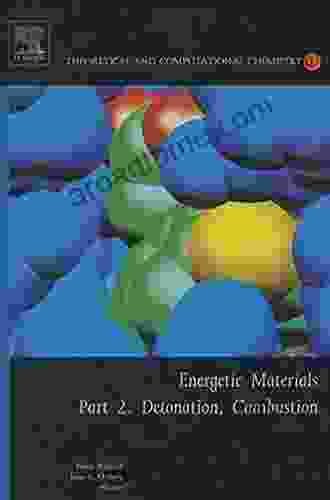
 Cody Blair
Cody BlairThe Ultimate Guide to Energetic Materials: Detonation and...
Energetic materials are a fascinating and...

 Kenzaburō Ōe
Kenzaburō ŌeProstitution, Modernity, and the Making of the Cuban...
By Emily A....

 Kirk Hayes
Kirk HayesUnveil the Enchanting World of The Rape of the Lock by...
Alexander Pope's epic...

 Ivan Turgenev
Ivan TurgenevTantric Quest: An Encounter With Absolute Love
Embark on a Tantric Quest to...

 Gary Reed
Gary ReedThe Darwin Awards: Evolution in Action
The Darwin Awards are a...
4.4 out of 5
| Language | : | English |
| File size | : | 2189 KB |
| Text-to-Speech | : | Enabled |
| Screen Reader | : | Supported |
| Enhanced typesetting | : | Enabled |
| Word Wise | : | Enabled |
| Print length | : | 306 pages |


